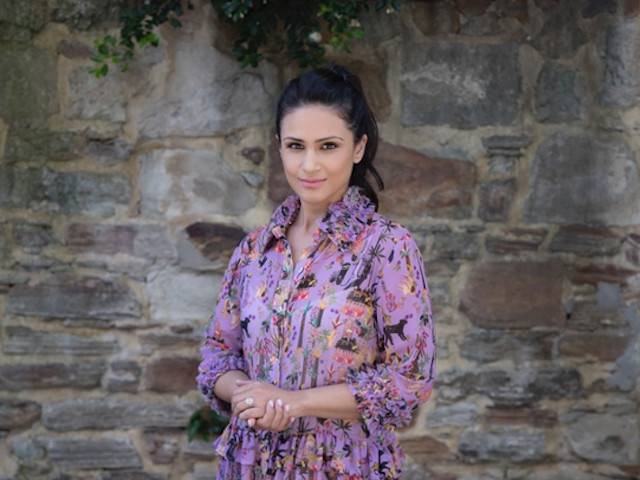Invest In Mental Wellbeing

Between isolation, job loss and uncertainty, Australia is in the midst of a growing mental health crisis.
Esha Oberoi (37) is the compassionate, inspiring and dynamic CEO and Founder of AFEA Care Services, Australia's most trusted disability care service. She is also an award-winning entrepreneur and self-love advocate who credits much of her success as a heart-centred leader and business owner to her transformative ideology that, 'mental health begins in the heart'.
See these tips from Esha to invest in your mental wellbeing
1. Accept sadness rather than suppressing it
After years of hardships, I was left suffering from depression and had to learn to embrace my emotions and heal from the pain I was carrying.
We become skilled at suppressing our emotions, often believing we have recovered from negative events in our life, when often these traumas resurface if we haven't really acknowledged and worked on them.
Our natural response to failure, stress or rejection is denial. We deny those feelings that are negative by compensating our emotional bodies with alcohol, food, work or retail therapy and never actually make an effort on confronting how we truly 'feel'.
I was not immune to this. I took to drinking in my youth and as an adult became a workaholic - anything to distract from having to feel. I think we all have a tendency to block how we feel by seeking distractions. The thing is, these emotions actually never go away, they just build up until we start to see imbalances whether emotional or physically in our bodies like sickness and stress.
It's incredibly important that we continue to work internally on ourselves, particularly now in the midst of a global pandemic when emotions and fears are high.
For me that means spending time alone and evaluating how I feel. Am I centred? Am I out of depth? How do I want to respond to this situation? Giving attention to our internal selves allows us to stay connected to our emotions, keeping them in check and leading to better mental health.
When we begin to acknowledge our emotions, we learn to face our 'failures' and recognise the lessons in each. We can start accepting our imperfect selves and begin to celebrate our evolution instead of judging and criticizing our mistakes and failures.
2. Find a place of mental stillness
Have you ever rushed a decision that you later regretted? Being "busy" is often worn like a badge of honour, when in fact the science has shown that we can't effectively multi-task and trying to do too many things at once is detrimental to our health, focus and outcomes.
Whenever I find myself feeling like I am rushing, I turn to meditation. It's so easy to say, "I don't have time," but when a 5-minute meditation might lead to better decision making and less headaches down the track, it makes sense to make time.
Meditation has helped me stay in the eye of the hurricane - that place of stillness when there is chaos that comes into life from fast growing a business and juggling a young family.
I also love meditation because it has given me space to allow all of my thoughts and emotions to surface in a safe and private place. The results come from being able to allow those aspects of ourselves to reveal themselves, giving us an opportunity to let go of them. Meditation brings the calm back into the chaos of life.
3. Reflect and journal your lessons
By writing things down, we can better reflect on what we have learnt and achieved. We often underestimate our value but can overcome these limiting thoughts through introspection and journaling. Write out all of the things you weren't aware of before that you're aware of now.
Learn to listen to your inner dialogue and begin to re-write any negative scripts you've been telling yourself that are becoming your truth.
4. Make decisions using your second brain
It has been identified that our second brain lies in our gut, which is why we often say 'my gut instincts'. Use your instincts and tap into your emotions when making decisions. Seek to understand your emotions instead of blocking them. Even a negative emotion such as jealously can give us so much insight into ourselves. Jealousy allows us to understand what our aspirations are and what we truly desire at that moment for ourselves. Next time you find yourself feeling jealous, use that insight to inspire action towards your wants or needs at the time. Then, let it go and release it, so you are not burdened from it.
5. Let go of attachments to outcomes
One of the best things I have done over the last few years is practised the art of going with the flow and letting go of any attachments to events, outcomes, achievements, people and places.
Never has this been so relevant. Coronavirus has thrown the world into chaos and brought many plans to a halt suddenly. It's natural for us to want to be in control of our lives, but we're all largely subject to outside influences that are beyond our control. Instead of fighting these with anger and fear, it's important we learn to embrace and work with the new directions our lives might be taking us.
I have deep aspirations for myself but I don't attach to them. I visualise what I desire, but then let those thoughts drift and release any attachments. This is an incredibly powerful tool and something that is easy to practise.
MORE





